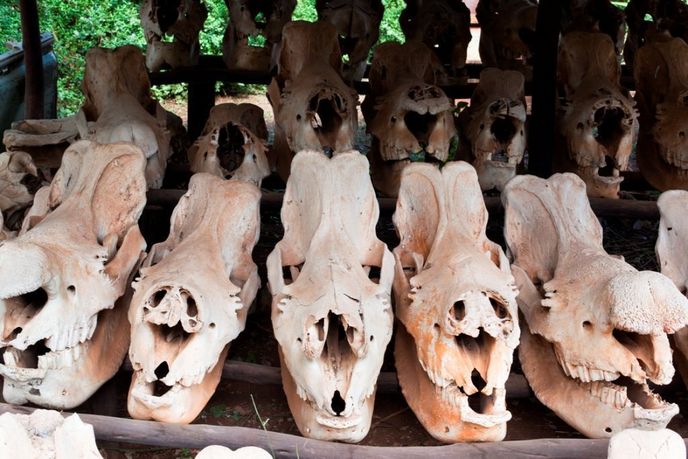On 13 February, London is set to host a high-level summit to tackle illegal wildlife trade. The conference will be attended by Heads of State and ministers from around 50 governments worldwide.
The conference will be led by the UK government; Prime Minister David Cameron, Foreign Secretary William Hague and Environment Secretary Owen Paterson. The Prince of Wales and The Duke of Cambridge will also be attending. The meeting will bring together non-governmental organisations and other key figures in the preventing the illegal wildlife trade.
 The illegal wildlife trade is a serious crime causing the destruction of wildlife worldwide. Many species, particularly rhinos, face extinction unless urgent action is taken. The illegal wildlife trade is one of largest illegal activities in the world – ranked alongside drugs, arms, and human trafficking. According to the UK government it is worth around £6 billion a year.
The illegal wildlife trade is a serious crime causing the destruction of wildlife worldwide. Many species, particularly rhinos, face extinction unless urgent action is taken. The illegal wildlife trade is one of largest illegal activities in the world – ranked alongside drugs, arms, and human trafficking. According to the UK government it is worth around £6 billion a year.
The illegal wildlife trade is destroying wildlife populations, in particular key species such as rhinos, elephants and tigers. But this is not just an environmental issue; wildlife crime is having a devastating impact on local communities, as well as posing serious threats to international and regional security.
The London conference, which will focus on elephants, rhinos and tigers, aims to tackle three interlinked aspects of illegal wildlife trade:
- strengthening law enforcement and the criminal justice system
- reducing demand for illegal wildlife products
- supporting the development of sustainable livelihoods for communities affected by the illegal wildlife trade
The meeting aims to secure high-level political commitment to tackle the illegal wildlife trade, with governments signing declarations, with specific actions for individual countries.
 The summit will follow a two-day workshop hosted at London Zoo and organised by United for Wildlife; Prince William’s new foundation. The workshop will be attended by conservation organisations including Save the Rhino, who are involved in tackling the illegal wildlife trade.
The summit will follow a two-day workshop hosted at London Zoo and organised by United for Wildlife; Prince William’s new foundation. The workshop will be attended by conservation organisations including Save the Rhino, who are involved in tackling the illegal wildlife trade.
Save the Rhino’s Deputy Director Susie Offord comments:
“Save the Rhino is pleased that world leaders are finally recognising the seriousness of the illegal trafficking of wildlife, which is causing the destruction of many animal species, including rhinos, worldwide and affecting people in those areas. We hope that they will use this occasion to take urgent action and stick to their commitments”
Facts about rhino poaching
- During 2013, 1,004 rhinos were poached in South Africa alone, which is the equivalent of nearly three per day
- At least another 100 rhinos were illegally killed in other countries during 2013, with Kenya and India recording the highest losses after South Africa
- There has been a 7,600% increase in rhino poaching in South Africa since 2007, when just 13 rhinos were killed
- The IUCN (International Union for Conservation of Nature) African Rhino specialist group predicts that during 2014, deaths of black and white rhinos will overtake births, pushing rhinos populations into decline
- Rhinos are being poached to extinction, at the current rate of killing, rhinos could be extinct in the wild by 2026
- Over recent years, there has been an unprecedented increase in demand for rhino horn in Eastern Asian countries, particularly Vietnam, where it is mainly now used as a status symbol, along with other uses such as treating a hangover or a miracle cancer cure
- Rhino horn is now worth more than gold and platinum and is more valuable on the black market than diamonds or cocaine
- Wildlife trafficking, including rhino horn has become more organised, more lucrative, and more dangerous than ever before, yet many governments up until now have not been doing enough to combat it. There are indications that rhino poaching is funding terrorism
 How you can help
How you can help
Get involved on social media, tweet and facebook to raise awareness of the London conference on illegal wildlife crime #endwildlifecrime
Take part in a social media tweet storm, with Thunderclap
Donate to Save the Rhino to support our rhino conservation work on the ground, along with efforts to reduce the demand for rhino horn through behaviour change campaigns in Vietnam
For more information on the London conference
UK Government – London Conference on the illegal wildlife trade
UK Government – UK Commitment to Action on Illegal Wildlife Trade (IWT)









